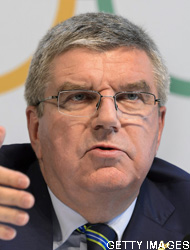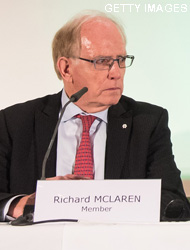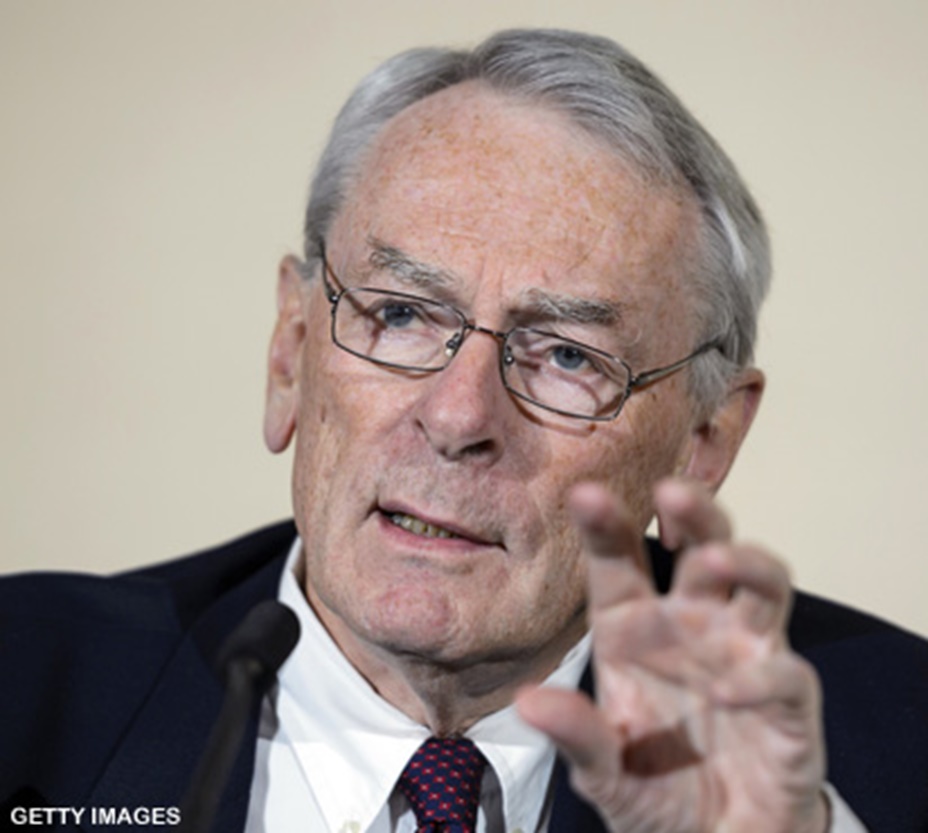A "devastating and damning report into Russian sport" has found that the country’s government, security services and sporting authorities "colluded to hide widespread doping" across "a vast majority" of winter and summer sports, according to Sean Ingle of the London GUARDIAN. The IOC has promised it will not hesitate to take the "toughest sanctions available" against those implicated. The review, led by "highly respected" Canadian lawyer Richard McLaren, found "widespread state action to hide cheating among Russian athletes in the run up to the London 2012 Olympics," as well as a "comprehensive" cover-up of doping during the World Championships in Moscow and the World University Games in Kazan in '13 and the Winter Olympics in Sochi a year later. IOC President Thomas Bach called the McLaren report "a shocking and unprecedented attack on the integrity of sports and on the Olympic Games." McLaren also confirmed "the staggering allegations" made by Dr. Grigory Rodchenkov, the head of the Moscow laboratory between '05 and '15, that steroid-tainted urine samples "were substituted with clean ones in Sochi with the help of Russia’s intelligence and anti-doping officials to enable athletes to pass doping tests." However, McLaren "refused to say whether his findings should lead to Russia being banned" from the Olympics in Rio which begin next month. He said, "My mandate was to establish facts not to make recommendations. It is for others to take and absorb and act upon my report" (GUARDIAN, 7/18).
'SHOCKING AND UNPRECEDENTED': In London, Martyn Ziegler reported the IOC "has called a crisis meeting of its ruling board" for Tuesday after what it described as a "shocking and unprecedented attack on the integrity of sport." Bach said, "The IOC will not hesitate to take the toughest sanctions available against any individual or organization implicated." The findings state that a minimum of 643 Russian athletes "had positive results" between '12 and '15 but "at least 312 were covered up." The 103-page report comes as a "hammer blow to Russia, which has been waging a public relations battle to avoid further exclusion from Rio." McLaren: "The Moscow laboratory operated, for the protection of doped Russian athletes, within a state-dictated failsafe system. The Sochi Laboratory operated a unique sample swapping methodology to enable doped Russian athletes to compete at the winter Olympic Games. The Ministry of Sport directed, controlled and oversaw the manipulation of athletes’ analytical results or sample swapping and the active participation and assistance of the FSB [Russian Federal Security Service], CSP [Centre of Sports Preparation for Russian athletes] and both Moscow and Sochi laboratories." Under the program, Russia's deputy minister of sports "would direct laboratory staff as to which positive samples to send through and which to hold back." The number of "disappearing positive test results" by Russian athletes included 139 from athletics, 117 from weightlifting, 28 from wrestling, 27 from canoeing, 26 from cycling and 18 from swimming (LONDON TIMES, 7/18).
 |
| Thomas Bach |
VINDICATION FOR RODCHENKOV: In London, Mark Critchley reported McLaren added that he had an "unwavering confidence" in his report's findings, which were proven "beyond reasonable doubt." The investigation was set up in May following an interview in the N.Y. Times with Rodchenkov, in which he "described an elaborate plan to ensure Russian success at Sochi 2014." Rodchenkov has been branded a "criminal" and a "traitor" by senior Russian figures. But McLaren's "intense" 57-day investigation has "completely vindicated the remarkable tale of state-sponsored cheating that he outlined in print in May" (INDEPENDENT, 7/18). In Sydney, Nicole Jeffery reported the U.S. and Canada "are now almost certain to lead calls for Russia to be completely banned from the Rio Olympics because of the report findings." Prior to the report's release "the lines had already been drawn between the pro and anti-Russian factions, in a sporting version of the Cold War." Anti-doping leaders from the U.S. and Canada drafted a letter last week "calling for a total ban on Russian athletes at the Rio Olympics." When that letter "was leaked to the media over the weekend, Russian allies began using it to try to discredit the McLaren report." IOC exec committee member Patrick Hickey claimed the report had been "compromised’" by the letter (THE AUSTRALIAN, 7/19). The BBC reported McLaren "sent a random amount of stored samples" from "protected Russian athletes" at Sochi 2014 to an anti-doping laboratory in London to see "if they had scratch marks around the necks of the bottles that would indicate they had been manipulated." McLaren said that "100% of the bottles had been scratched" but added that would "not have been visible to the untrained eye" (BBC, 7/18).
FIG SPEAKS OUT: REUTERS' Martyn Herman reported the Int'l Gymnastics Federation (FIG) said that Russian gymnasts "must be allowed to compete in the Olympic Games and not tarred with the same brush as the country's banned track and field athletes." The FIG said in a statement, "FIG is concerned about the increasing number of officials asking for a blanket ban of Russian athletes to participate at the forthcoming Olympic Games in Rio. Whilst FIG fully supports the IOC's policy of "Zero Tolerance in Doping", it strongly feels that not all Russian athletes of all sports should be banned and found guilty for actions in other sports and federations." FIG said that Russian gymnasts have been subject "to controls equal to those of our other leading gymnastics federations and that they should be in Rio." FIG President Bruno Grandi said, "The rights of every individual athlete must be respected" (REUTERS, 7/18).
 |
| McLaren's review found cover-up. |
BLANKET BAN POSSIBLE: In London, Rick Broadbent reported WADA Founding President Dick Pound said that there "could be a blanket ban on all Russian competitors at the Olympics." Pound: "The timescale exists [to implement a ban] if that's what the evidence shows." Pound said that he was "unimpressed with Russia’s response to its track and field ban." He said, "Whenever they get caught in something like this, they [Russia] have a tendency to have an indoor hammer throw, swinging at everything and complaining at everything" (LONDON TIMES, 7/18).
IPC, IAAF REACT: Int'l Paralympic Committee President Philip Craven said in a statement, "We are truly shocked, appalled and deeply saddened at the extent of the state sponsored doping programme implemented in Russia ahead of Sochi 2014. The findings of the McLaren report mark a very dark day for sport. The IPC will now analyse the report’s findings in detail to evaluate what impact they have on the Paralympic Movement and Para Sport. After an initial review of the report, we note the 35 'disappearing' positive samples from Paralympic sport between 2012 and 2015 and have sent a letter to WADA and the report’s author Richard McLaren seeking further information on these samples" (IPC). IAAF President Sebastian Coe said, "The institutionalized and systematic doping in Russian athletics is the reason the IAAF suspended, and then upheld the suspension of, RusAF's membership and consequently the exclusion of their athletes from international competition" (IAAF).






